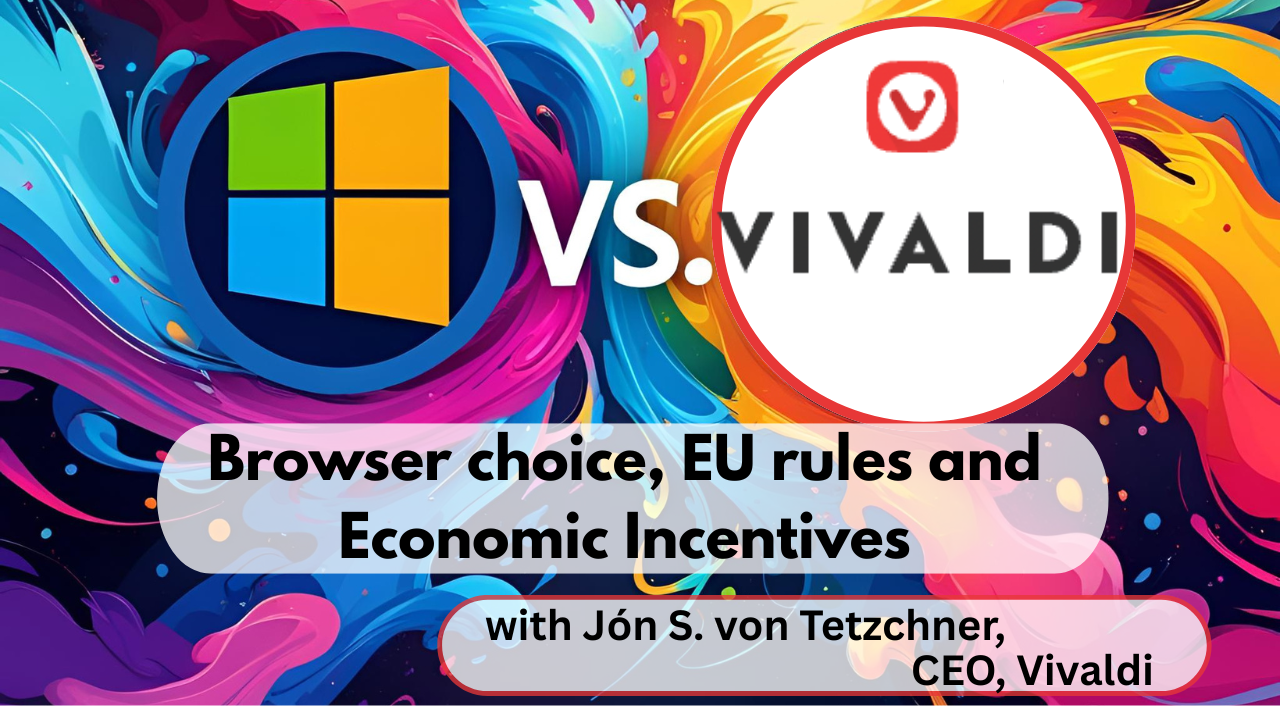(This summary has been automatically generated with AI)
At Antitrust Intelligence, we recently sat down with Jon von Tetzchner, CEO of Vivaldi, and Bruce Lawson, the company’s Head of Communications, to discuss Vivaldi’s mission, the challenges of competing against tech giants, and the role of regulation in fostering digital fairness. Vivaldi’s advocacy in Brussels and its calls for stronger enforcement of the Digital Markets Act (DMA) provide a timely lens on the struggle for genuine consumer choice in Europe’s digital economy.
A Browser Built for Individuals
Vivaldi, a Norwegian-Icelandic company, is not just another browser. As von Tetzchner explained, the firm’s philosophy is to design technology that adapts to individual user needs. With deep roots in browser innovation—dating back to his days at Opera in the 1990s—von Tetzchner emphasized Vivaldi’s approach: “When in doubt, make it an option.” Vivaldi offers extensive customization, including advanced tab management tools like tab stacking, workspaces, and flexible placement of the tab bar. It integrates tools often missing from mainstream browsers, such as a built-in mail client, calendar, feed reader, ad blocker, tracker blocker, and a partnership with Proton for VPN services.
However, Vivaldi’s identity is defined as much by what it avoids as by what it offers. The company has taken a clear stance against surveillance capitalism. “We don’t collect data on what you’re doing in the browser,” von Tetzchner stressed, highlighting that Vivaldi’s synchronization services are encrypted end-to-end, with no access to users’ personal data.
Facing Goliaths: Competing Without Self-Preferencing
When asked about competing with dominant browsers like Google Chrome and Microsoft Edge, von Tetzchner pointed to the stark asymmetry in resources and distribution. Lacking the financial power and integration into operating systems that their rivals enjoy, Vivaldi relies on word of mouth, positive reviews, and its growing community of users seeking alternatives to big tech.
Bruce Lawson underscored the commercial and ethical challenges smaller browsers face: “Big tech companies steer people towards their own products and away from ours. It’s about consumer choice, but it’s also about survival for independent companies like Vivaldi.” He noted that this self-preferencing has consequences beyond market competition—it feeds business models based on extensive data collection and profiling that many consumers reject.
Regulation as a Tool for Fairness
Both von Tetzchner and Lawson agreed that regulation is key to restoring fairness in the digital economy. They expressed strong support for the DMA’s aim of limiting gatekeeper platforms’ ability to lock users into their ecosystems. “We want to see the DMA enforced adequately,” Lawson said, while acknowledging its imperfections. He also pointed to the need for complementary legislation like the proposed Digital Fairness Act to address deeper concerns around consumer consent and data exploitation.
Lawson and von Tetzchner believe that ex ante regulation—rules that proactively prohibit harmful conduct rather than waiting for harm to occur—is essential to counterbalance the immense financial and legal resources of big tech firms. “The EU is the perfect venue for this,” Lawson noted, describing it as a confederation of smaller nations that have recognized the strength of working together to address systemic challenges.
The Broader Societal Stakes
Beyond browser choice and market share, von Tetzchner highlighted the societal impact of unchecked data collection and profiling. He advocated for stronger rules to ban profiling for advertising purposes and algorithm-driven content targeting, arguing that these practices contribute to societal division and the erosion of trust. “If we could move back to content-related advertising, I think that would be better for everyone,” he said.
Both speakers reflected on the original promise of the internet—a space for openness, free expression, and democratized information—and their desire to see that vision restored. “We’re old enough to remember that promise, and we want it back,” Lawson said.
A Growing Appetite for Alternatives?
The conversation concluded on a cautiously optimistic note. Von Tetzchner pointed to growing interest in alternatives to big tech in Europe, citing notable user growth for Vivaldi in countries like Norway, Denmark, and others across the continent. While regulatory change is essential, he noted, user demand for privacy-respecting, independent technology is also driving positive momentum.
As Vivaldi continues its advocacy in Brussels, including its participation in the Browser Choice Alliance alongside other independent browsers, the company’s mission exemplifies the broader struggle for fairness and diversity in the digital economy—one where innovation and ethics can coexist without being overshadowed by monopoly power.
